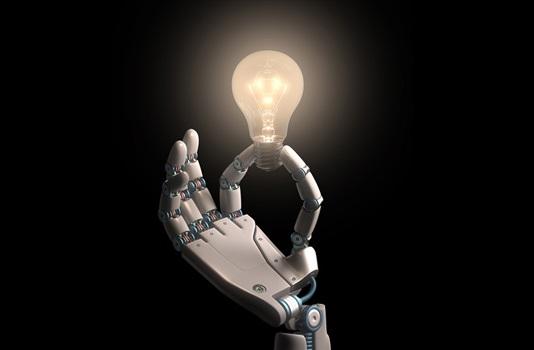[NetEase smart news September 1 news] Look at this, this intricate artificial intelligence world! There are many examples of artificial intelligence, ranging from optimization practices to how to get AI to serve your business, and how it will affect consumers... The list goes on. The fact is that some AIs are too complex, especially given the current and short-term needs, companies at this stage do not have to over-work on whether to invest in them. On the other hand, as the media continues to talk about artificial intelligence and automation, the pressure to force people to understand more truth is increasing. In order to eliminate this anxiety, we have collected 11 views from the leaders of the tech industry on artificial intelligence, which will take you deeper into the concerns of today's artificial intelligence research (and its reasons). 1. Artificial intelligence is not always the right solution Companies need to carefully and systematically weigh their own choices to determine whether artificial intelligence is suitable for the company's development. If so, then it will be an orderly roadmap to ensure consumer warmth and product life. Jason VandeBoom, founder and CEO of ActiveCampaign, a marketing automation and CRM platform provider for SMBs: Many times, artificial intelligence is used as an expedient solution to existing business problems, and as a selling point. However, companies should be vigilant: Artificial intelligence is not a "fast food," and marketers should not be blindly superstitious. On the other hand, by definition, expedient means non-personalization. Most importantly, the solutions companies need are exactly tailored to their specific needs, not just solutions that meet everyone's needs. Before entering the field of artificial intelligence, policy makers should first ask themselves whether the company needs an artificial intelligence solution. If a company does not have the problems of artificial intelligence, such as dealing with massive amounts of data and calculations, then they will wisely cross the press to praise this technology and find a personalized solution that suits their business. In addition, we must understand that inputting garbage is equal to outputting garbage. When approaching a new technology based on internal and external data, the company's decision-makers need to be progressive. Before exploring data-based techniques for computing, they must first learn to organize and classify data. 2. Artificial intelligence provides more operational insights for B2B vendors in the supply chain By using artificial intelligence to optimize B2B data, e-commerce workers can greatly increase efficiency and gain valuable consumer insights while automating inventory management. Ray Grady, president and chief culture officer of CloudCraze, the only B2B business platform founded on Salesforce: Although B2B is still in its infancy, artificial intelligence has the potential to revolutionize e-commerce in terms of operations and buying experience. Artificial intelligence delivers a large amount of operational data to companies, enabling them to analyze consumer needs and comprehensive data, thereby changing their business dealings with customers and improving internal operations. Combining consumer browsing and buying habits with external data such as weather forecasts, regional trends, and crop yields to provide suppliers with decision-making information on product pricing, inventory replenishment, and product promotion. On the other hand, artificial intelligence makes it easier for B2B buyers to manage inventory and automate orders to ensure that inventory levels are balanced. Artificial intelligence helps buyers and sellers make more strategic decisions, saving time, increasing sales, and getting more profits. †3. Artificial intelligence is creating a more personalized digital experience Retailers can improve customer experience by creating or improving front-end personalization, and both artificial intelligence and machine learning will be the driving force behind this. ED Kennedy, Senior Commercial Director of Episerver, a single-platform supplier managing digital content, business, and marketing in the cloud: Artificial intelligence in business is often misunderstood and over-hyped. Retailers should see artificial intelligence as another tool to improve and improve the customer experience. A key area where artificial intelligence improves the customer experience is personalization. There is no doubt that consumer demand for highly personalized business experiences will gradually increase. According to Episerver's "Refactoring Business" report, more than one-third of consumers believe that brands do a poor job of personalizing customer experience - which means that retailers will eventually miss a large amount of revenue. Machine learning, a branch of artificial intelligence, can use consumer real-time behavior and historical order data to automatically recommend personalized products, promotions, and content to consumers. Excitingly, we now see retailers of technological innovation using artificial intelligence-based personalized experiences, not only on web pages and mobile devices, but also extend to physical stores such as optional mirrors, or Used to show the customer's product category. †4. Artificial intelligence is helping retailers solve the thorny issues that have occurred in the three historical purchases Search, real inventory management and real-time price management can all be positively impacted. Retailers need to carefully weigh in order to consider how to optimize. Michael Fauscette, Chief Research Officer, G2 Group, a business software and service review platform: In the retail/e-commerce field, the practical use of artificial intelligence is mainly to solve three basic problems: helping customers find their favorite products online and offline, and placing “appropriate†inventory in the form of “appropriate†product portfolios.†The right place; real-time price adjustments to stay competitive. The first problem is solved through an artificial intelligence-based search engine, sometimes referred to as the "insight" engine, and the use of chatbots to manage interactions. The second problem is solved by using artificial intelligence to provide dynamic inventory forecasting or order frequency forecasting to determine the optimal inventory quantity and location, and to optimize the dynamic product classification of the product sales plan. The third problem is managed through a dynamic pricing engine that continuously monitors pricing and dynamically adjusts to keep product prices optimized. In all three cases, artificial intelligence can provide output for massive dynamic data sets and products. At the same time, this engine can learn and adjust in real time based on dynamic feedback to perform self-optimization. 5. Artificial intelligence is willing to listen to the voice of customers Consumers now have access to dynamic artificial intelligence machine learning, natural language processing (NLP), and speech analysis feedback scenarios. This, coupled with deep social listening and "emotional analysis," is another opportunity to gather credible consumer demand. Spencer Morris, InMoment, a vice president and head of big data science that aims to provide businesses with a well-known online platform that listens to customers and employees in ways that optimize the customer experience: Artificial intelligence has been applied to work in a very practical way. This helps simplify tasks, integrates relevance and personalization into human-machine dialogues, and promotes human decision-making and execution. Some brands we work with already use various artificial intelligence elements (machine learning, natural language processing, prediction, speech analysis, etc.) in the feedback scenario. Allowing the technology to dynamically adjust follow-up issues based on consumer feedback will result in a better data-human dialogue. Artificial intelligence has also been widely applied to real-time understanding of consumer voices expressed on social media, video, and telephone conversations, and it addresses issues of all kinds - from supply chain issues to legal security emergencies, to companies automatically. Multiple fields send out information. Another commercial application of current artificial intelligence is the continuous mining of a large number of existing data types in real time. Artificial intelligence "monitors" patterns in human conversations and warns of potentially abnormal events. In this way, business users can easily understand the form, location, and cause of the anomaly, and take wise action accordingly. This kind of artificial intelligence can be more accurately called SAI - Super Artificial Intelligence - because it can handle large amounts of complex and different data in seconds and minutes - even the smartest and most sensitive human analysts. Can't do this. By automating complex events and everyday tasks, and promoting humans to make more sensible judgments (at this point machines are far from humans), artificial intelligence can make businesses smarter, faster, and even more human. †6. Artificial intelligence is revolutionizing the way we provide services to our customers Chat bots are no longer just a wave - they are integrated into a wide variety of interactions, including retailers. With the ability to machine learn and “clustering†messages, companies can understand, evaluate, and solve customer needs more intelligently and accurately. Greg Reda, head of big data science at social media management software Sprout Social: The emergence and development of chatbots are of great significance to the application of artificial intelligence in enterprises, but unlike the hype in magazines, the technology community is still far from the real artificial intelligence chatbots. For brands, the first priority is to solve problems, not artificial intelligence. The ultimate goal is to optimize the human-computer cycle to improve efficiency. We learned from the social customer service team that when they handle a large number of consultation calls every day, they do not know which customer issues should be prioritized when developing chat bots. This provides an opportunity to integrate similar information through machine learning, and eventually screen out common consultation content and topics. When the customer service team sees these information groups, they can intuitively understand which issues should be prioritized when developing chat bots. In my opinion, this sort of analysis, analysis, and the combination of machine learning and human decision-making are the biggest opportunities for companies. †7. Artificial intelligence will change the rules of the game and help us achieve our goals more intelligently Combined with artificial intelligence, targeted advertising can more accurately target customers. Jason Nesbitt, Vice President of Media and Agency Business at Strike Social, a social adware and management company: The Strike Social Report and The Big Picture:2017 YouTube Advertising Benchmark Report show that YouTube’s advertising retail industry’s viewing rate is 76% lower than the industry average. The 18- to 34-year-old crowd is most affected by YouTube, and the retail sector needs to figure out how to better attract this group to drive sales. It's time to rely on artificial intelligence. By using machine learning algorithms, advertisers can find new subdivisions within 18 to 34 years of age – including demographics (eg, gender) and relevance to platform goals (eg, different affinity audiences)—and Optimize activities for them. This method can provide a variety of ways for companies to solve difficult problems and achieve better results. †8. Artificial intelligence has a profound effect on physical stores Physical retailers are using in-store chat bots to increase customer engagement and shopping experience. As long as robots can provide relevant shopping navigation, consumers' willingness to this concept may become more sticky and gradually become weary. Matt Fleckenstein, chief marketing officer of Nintex, a workflow and content automation (WCA) software and platform: More and more retailers are applying artificial intelligence technology to in-store experiences, using robots and in-store chat bots to increase user engagement, helping consumers find what they need in the store. Today, these experiences focus on using robots to receive and understand consumer voice instructions and help consumers find the right products to help consumers find products of interest. Retailers even started testing robots to pick and pack customer orders for customers. In addition, according to McKinsey data, e-commerce has long been using artificial intelligence to obtain product recommendations - Amazon's 35% of purchases come from algorithm-based recommendations that will be used by past customers to purchase, search for products, and other people's purchases. Associated with the consumer's buying behavior. For voice-control assistants like Amazon's Alexa, it's only a matter of time (maybe days or weeks) to move from simple command execution to the start of independent product recommendation. 9. Artificial intelligence is optimizing online shopping experience Barry Pellas, chief technology officer and chief business expert at PointSource, a Globant subsidiary of the digital conversion agency: The real value of artificial intelligence lies in its role in promoting operations and optimizing the shopping path - retailers need to invest time in "determining the most practical use" to ensure that they do not deploy solutions without strategic value. The key to applying artificial intelligence to the retail industry is to combine the actual technology with a well-operated storefront. The retailer analyzes customer's more information through analysis each day. On the other hand, the exchange channel is affecting their success indicators. The practical application of the combination of these two key success factors and artificial intelligence can help end users realize a more personalized experience and help users to redeem. Retailers can use artificial intelligence to predict possible conversion channels and let it seamlessly jump to the next step. If the shopper's redemption requires four steps, they can predict with certain accuracy the possibility that the customer will achieve this goal at each step and push it further to the exchange goal. This type of exercise will form a cycle in which analysis will further drive predictions and the machine will learn the best way to help users shorten the exchange route. The key to the successful integration of artificial intelligence into retail systems is that it will always keep in touch with system users. If you do not improve the lives of all types of users, then using the new technology of artificial intelligence may be another way. †10. As opportunities increase, the threshold for artificial intelligence will decrease As more and more players join the artificial intelligence game, it not only provides more opportunities, but also reduces the risk of developing artificial intelligence - because the road has been paved. Erik Brown, Technical Director of West Monroe Partners, a business and technology consulting firm: The sheer number of existing data, and the popularity of accessible machine learning libraries like Google's Tensor Flow and Spark MLLib, give developers more options to develop software that can really learn and interact. The reduction of artificial intelligence technology barriers will open the door for retailers and other organizations that usually do not have sufficient R&D budgets. For example, current product recommendations can be driven by smarter models that will realistically determine the most preferred product based on the consumer. Perhaps learning from recent transaction history can predict a daily event and provide relevant advice, or analyze that recent delivery delays can trigger real-time interactions or requests to reduce consumption and cancel support requests. Just as Netflix aims to predict what users want to watch when they open an app, retailers need to find opportunities to learn from personal behavior and other relevant data and provide meaningful activities through the right channels. †11. Artificial intelligence will bring unprecedented degree of personalization Personalized services are expected to reach new heights, and throughout the end-to-end e-commerce operations, both retail and customer experience will produce significantly improved output and delivery. Ken Yontz, Vice President of Global Transformation Management at WorldSync, the world's leading product information network: Artificial intelligence has the potential to change the product data of the entire e-commerce ecosystem from the depth of the supply chain to customer-facing content. Over time, this technology will allow manufacturers to have a deeper understanding of the most important products and standards of consumers. They can use these technologies to optimize procurement and strategic product development. On the consumer side, we will see personalized information for each individual, instead of an "appropriate model" message template. For consumers and producers, product data will provide information, personalization and executable information. †The artificial intelligence world will continue to develop - you can choose how to participate in it, or sit sideways and observe its development. In any case, this is a fascinating experience. (Source: Forbes Author: Tom Popomaronis compile: NetEase see foreign intelligence platform compiler revision: Fan Air) Communication Cable,Communication Wire,Data Communication Cable,Comms Wire Shenzhen Bendakang Cables Holding Co., Ltd , https://www.bdkcables.com




